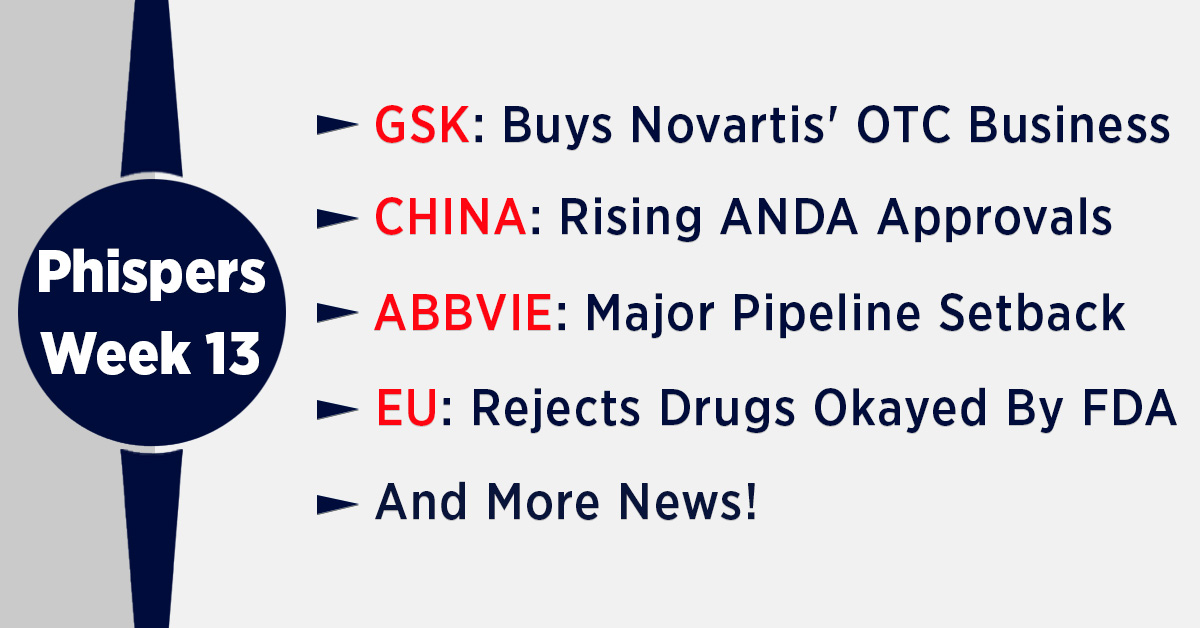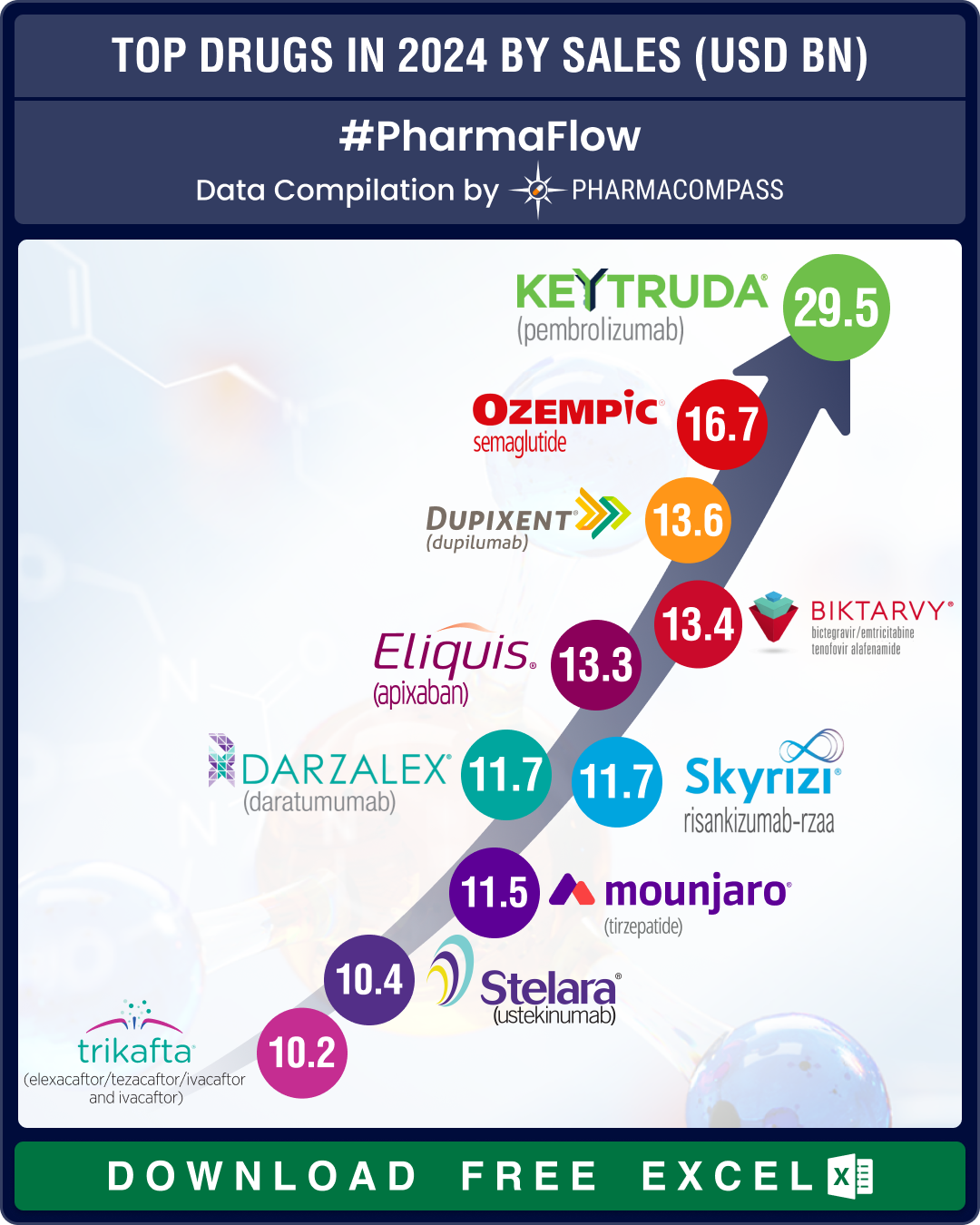
This week, Phispers brings you news on Pfizer’s OTC auction. After Reckitt Benckiser, even GSK opted out of the race, leaving analysts wondering whether Pfizer will hang on to it, or spin off the unit. There is news on two mid-stage drug failures — Ablynx’s lupus drug vobarilizumab and AbbVie’s lung cancer drug, Rova-T. Ablynx had been recently acquired by Sanofi. Meanwhile, there is news that Chinese drug companies saw 38 ANDA approvals from the USFDA in 2017. EU rejected two drugs approved by the USFDA; and Novo Nordisk roped in a former head of an oil company as its chairman.
GSK bows out of Pfizer OTC auction; picks up 100% stake in Novartis’ OTC business
Last week, Reckitt Benckiser had pulled out of Pfizer’s consumer health auction. With Reckitt’s exit, British drug major GlaxoSmithKline was considered the leader in the race for the division. Soon, GSK too withdrew from the deal talks.
While there was news last week that Glaxo had made a final bid valuing Pfizer’s over-the-count (OTC) treatments at about US$ 15 billion to US$ 20 billion, GSK’s CEO Emma Walmsley ruled out its interest through a statement. “While we will continue to review opportunities that may accelerate our strategy, they must meet our criteria for returns and not compromise our priorities for capital allocation,” she said.
With GSK’s withdrawal, there is talk that Pfizer may hang on to its OTC products portfolio. In a note, Credit Suisse analyst Vamil Divan said it is “tough to dance without a partner,” indicating that Pfizer could also spin off the unit.
Meanwhile, GSK has reached an agreement with Novartis to acquire full ownership of its consumer healthcare business. GSK is buying out Novartis’ 36.5 percent stake in the joint venture for US$ 13 billion (£9.2 billion).
With this acquisition, GSK is in full control of a joint venture that owns successful OTC products like Sensodyne toothpaste, Panadol headache tablets and Nicotinell patches. In 2017, the business had reported sales of US$ 11 billion (£7.8 billion).
Possibly, this was the reason why GSK ended deal talks with Pfizer for its OTC portfolio.
It is also learnt that GSK would initiate a strategic review of Horlicks and other consumer nutrition products to fund this transaction. The strategic review will include an assessment of the group’s shareholding in Indian subsidiary — GlaxoSmithKline Consumer Healthcare Ltd. Horlicks and other nutrition products are highly popular in India, with the Horlicks range widely recognized as a portfolio of premium nutrition products. GSK expects the outcome of the strategic review to be known around the end of 2018.
Sanofi’s recent buyout — Ablynx — sees a mid-phase drug failure
In late January this year, Sanofi had snapped up Belgian biotech company Ablynx for US$ 4.8 billion, days after it had bought Bioverativ for US$ 11.6 billion.
Ablynx specializes in the research of novel drugs based on nanobodies (which are found in the immune systems of llamas and alpacas).
However, this week there was news that Ablynx’s systemic lupus erythematosus (SLE) drug — vobarilizumab — has failed the mid-phase trial. Vobarilizumab failed to meet its primary endpoint, as the study failed to detect a dose response at week 24 according to a lupus assessment score. This is just one of the drugs Sanofi is set to acquire through its acquisition of Ablynx.
Investigators enrolled 312 patients with moderate to severe, active seropositive SLE and randomized them to receive one of four doses of anti-IL-6R single-domain antibody vobarilizumab or placebo. The study failed to detect a dose response at week 24.
Though a failure in the Phase 2 trials may deal a terminal blow to vobarilizumab in SLE, and to Sanofi to recover its investment in Ablynx, the drug was never a focal point of the takeover.
Chinese drug companies see sharp rise in ANDA approvals in 2017
The Chinese pharma companies are making it big in the international market. In 2017, the US Food and Drug Administration (USFDA) approved 38 abbreviated new drug applications (ANDAs) from Chinese pharma companies, 16 more than those approved in 2016.
Companies receiving official approvals comprise Huahai Pharmaceutical (8), Jiangsu Hengrui Medicine (6), CSPC (5), Zhejiang Hisun (4), Humanwell Healthcare (3), Novast Laboratories (3), Abison (1), and LP Pharma (1).
There were several first timers too, who received temporary ANDAs — such as Reyoung (Sildenafil), AlignScience Pharma (Glucophage XR), Huaren Pharmaceutical (Valsartan/hydrochlorothiazide), Buchang Pharmaceuticals (Tadalafil), etc.
The company that made a clear mark was Huahai Pharmaceutical — its total ANDAs increased from three in 2011—2015 to six in 2016.
The value of an overseas approval is becoming increasingly prominent in the Chinese market. A USFDA certification and the number of ANDA approvals also impacts the competitiveness of a Chinese company in the global market. A round of supportive policies has helped Chinese companies in getting more ANDA approvals. However, China still lacks new drug application (NDA) breakthroughs.
AbbVie’s potential blockbuster for lung cancer suffers serious setback
Earlier this month, AbbVie and its partner Biogen had announced they were pulling Zinbryta from the market as a treatment for relapsing multiple sclerosis. Well this week, there was more bad news from AbbVie.
AbbVie had high hopes from its oncology drug Rova-T, a treatment for small cell lung cancer (SCLC). Back in June 2016, AbbVie had projected that Rova-T, a drug it had acquired through the acquisition of Stemcentrx, will earn US$ 5 billion in peak sales.
However, mid-stage data for this experimental drug was disappointing. As a result, AbbVie won’t be going to the USFDA for an accelerated review, “based on magnitude of effect across multiple parameters in this single-arm study,” the company said.
“We continue to believe Rova-T has potential for patients with small cell lung cancer and other DLL3-expressing cancers,” Mike Severino, MD, EVP of research and development and chief scientific officer at AbbVie, said. “Although the results from the study were not what we hoped for, we look forward to receiving data from the ongoing phase 3 studies in the first- and second-line settings and remain committed to developing Rova-T for the treatment of patients with small cell lung cancer,” he added.
EU
rejects two drugs approved by the USFDA
Last week, the European Medicines Agency (EMA) raised questions about two treatments approved by the USFDA in 2017. EMA’s Committee for Medicinal Products for Human Use (CHMP) then rejected two medicines, Dexxience (betrixaban), approved by the USFDA in June 2017 as Bevyxxa (betrixaban) to prevent venous thromboembolism, and Eladynos (abaloparatide), approved by the USFDA in May 2017 as Tymlos (abaloparatide) for the treatment of postmenopausal women with osteoporosis at high risk for fracture.
There have been similar instances of EMA rejecting drugs approved by the USFDA in the recent past. In February this year, the CHMP had adopted a negative opinion for Puma Biotechnology’s Nerlynx (neratinib), intended for treatment of breast cancer, approved under the same name by the USFDA in July 2017.
For betrixaban, CHMP said: “The main study did not satisfactorily show that Dexxience’s benefits outweighed its risk when used for preventing blood clots in patients admitted to hospital for recent medical illness.”
For abaloparatide, CHMP said: “The main study did not satisfactorily show that Eladynos is effective at preventing non-vertebral fractures in women who have been through the menopause. The data from two of the study sites were not reliable and had to be excluded as the study had not been conducted in compliance with ‘good clinical practice’ (GCP) at those sites.”
Meanwhile, the CHMP has recommended six medicines for approval, including two generic drugs. These include Clovis Oncology’s Rubraca (rucaparib) for treatment of relapsed or progressive ovarian cancer; and ViiV Healthcare’s Juluca (dolutegravir/rilpivirine) for the treatment of human immunodeficiency virus (HIV) infection, which was approved by the USFDA in November 2017.
Two biosimilars were also recommended by CHMP: Amgen and Allergan’s Kanjinti (trastuzumab) for the treatment of breast and gastric cancer; and Sandoz’s Zessly (infliximab) for the treatment of rheumatoid arthritis, Crohn’s disease, ulcerative colitis, ankylosing spondylitis, psoriatic arthritis and psoriasis.
On
the lookout for acquisitions, Novo Nordisk gets former oil boss as its chairman
Diabetes drug giant Novo Nordisk has roped in former oil boss Helge Lund as its new chairman. This has been undertaken with the intention of increasing price pressure and seeking to broaden its blood products line-up. Lund’s experience in M&As is a big draw for the Danish drug major.
Lund oversaw Kvaerner’s merger with Aker Maritime. He later became head of Statoil, where he was in charge during the oil major’s acquisition of Norsk Hydro’s petroleum business.
Novo has been on the lookout for promising assets to boost its struggling blood products. More recently, it was aiming to buy Ablynx, but lost out to Sanofi.
In 2016, the Harvard Business Review (HBR) had named the then CEO of Novo Nordisk, Lars Rebien Sørensen, as the “best-performing” CEOs in the world. Sørensen and his fellow CEOs were judged on a variety of financial, environmental, social, and governance metrics.
Sørensen had won the rank for overseeing astonishing returns for shareholders and for growth in its market capitalization. Sorensen had stepped down as Novo’s CEO in 2016.
The PharmaCompass Newsletter – Sign Up, Stay Ahead
Feedback, help us to improve. Click here
Image Credit : #Phisper Infographic by SCORR MARKETING & PharmaCompass is licensed under CC BY 2.0
“ The article is based on the information available in public and which the author believes to be true. The author is not disseminating any information, which the author believes or knows, is confidential or in conflict with the privacy of any person. The views expressed or information supplied through this article is mere opinion and observation of the author. The author does not intend to defame, insult or, cause loss or damage to anyone, in any manner, through this article.”






